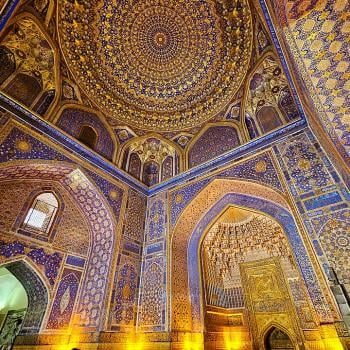This week some theology, but done against the background of an earlier column, "Just say . . . 'Whatever!'"
Like all religions, Mormonism often speaks of God's transcendence. But usually when Mormons use that term we are not making a metaphysical claim. Instead we are using transcendent to mean "superlative": God is supremely good or loving or just or something else.
Non-Mormon Christians have argued that it is not enough merely to say that God is the most loving person. To be worthy of worship, he must transcend us in more than magnitude. For them, that transcendence is located in creation: God is uncreated, infinitely being from all eternity, but as created beings humans are finite from the creation and for eternity afterward. That difference cannot be overcome. Even the Orthodox and Catholic doctrine of theosis, becoming like God, becoming fully in the image of God, does not erase the distinction between Creator and creature.
Mormons do not believe in an ontological difference between God and us. We believe that we share in the essence of God in that, as individuals, we too are eternally uncreated. Among Latter-day Saints, this is the common interpretation of what Joseph Smith is reported to have said [see Ehat and Cook, The Words of Joseph Smith 352, 359-360] and Abraham 3:18. I am using that common interpretation, which assumes that human beings are eternally uncreated individuals, called "intelligences." God is an uncreated intelligence; each human person is also an uncreated intelligence.
Of course the being that human beings share with God—the being of intelligence—is not fully developed in us and can be fully developed only through the grace of God. Nevertheless, there is some sense in which we are, embryonically, the same as God. To use the language of B. H. Roberts, we are "of the same species" (The Mormon Doctrine of Deity [n.p.: 1903] 255).
That belief is dangerous, for it runs the risk of idolatry, the idolatry of bringing God down from his majesty and making him merely another person or thing in our world. He remains merely another person, even if he is a very powerful person or thing, perhaps an infinitely powerful one. If that is what we think God is, then we worship an idol, the most powerful person amongst us. Given the Mormon claim that in some sense God and humans are the same, how can we avoid idolatry? Can we speak of his transcendence as anything other than just magnitude?
I think the answer is yes.
First consider this definition of transcendence: "the transcendent is beyond representation in a conceptually comprehended totality." Given that definition, even mere things are transcendent. Though representation and conceptualization are necessary to our relationship to those things, no representation or conceptualization is fully adequate to the individual thing we encounter. Each entity transcends us.
Obviously my inability to represent an entity totally doesn't mean that I cannot represent it adequately. Most of the time we do well enough, or better than well enough. It doesn't even mean that I never encounter things themselves. I can encounter a thing itself rather than only my conceptualization of it, and when I do I encounter it as overpowering, amazing, bedazzling: my experience is of something exceeding my understanding. I find myself in awe and wonder at things in their transcendence.
But even though I encounter transcendent things in the world, God is not merely one of those things. How does his transcendence differ in principle from the transcendence of worldly things? If it does not, then it is difficult to see how we can avoid idolatry.
To respond to that question, let me (once again) borrow from Emmanuel Levinas and what he says about persons, who transcend us differently than do other things. By analogy, understanding how persons transcend us can help us understand how God transcends us in more than merely magnitude.





